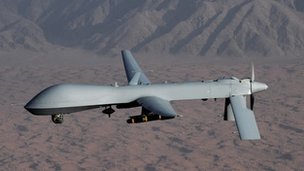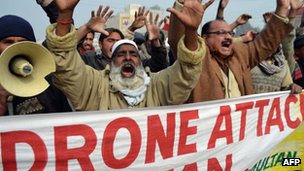UN launches inquiry into drone killings

The use of drones has become increasingly controversial
The UN is launching an inquiry into the impact on civilians of drone strikes and other targeted killings.
There is a need for "accountability and reparation where things have gone badly wrong", the British lawyer heading the investigation told journalists.
Ben Emmerson QC, a UN special rapporteur, said the "exponential" rise of drone technology required a proper legal framework to be put into place.
The inquiry will study the impact of drone strikes in five places.
Twenty-five attacks will be examined - in Pakistan, Afghanistan, Yemen, the Palestinian territories and Somalia.
Mr Emmerson told journalists in London that the increasing use of drones "represents a real challenge to the framework of international law".
If unregulated, he said, the use of drones would continue to grow.
The inquiry will assess the extent of civilian casualties, the identity of militants targeted and the legality of strikes where there is no UN recognition of a conflict.
Defenders of drones say they minimise civilian casualties, but opponents say drone strikes can constitute extra-judicial killing and point to data suggesting hundreds of civilians have died in such strikes.
'War crime'Drones - or unmanned aerial vehicles (UAVs) - have become an increasingly potent weapon for nations seeking to target militants but there is increasing controversy over their toll on civilians.

Drone attacks have been a key source of tensions between the US and Pakistan
Between 2004 and 2013, CIA drone attacks in Pakistan killed up to 3,461 people - up to 891 of them civilians, according to research by the Bureau of Investigative Journalism.
The vast majority of the strikes were carried out under the administration of President Barack Obama, it said.
Some kinds of drone attacks - in particular "double tap" strikes where rescuers attending a first blast become victims of a second - could constitute a war crime, Mr Emmerson has previously said, according to the Guardian newspaper.
Addressing journalists on Thursday, he denied the inquiry was unfairly singling out the US and Israel, saying 51 states had the technology to use drones.
He said it was not a substitute for "effective, official and independent investigation" by states, and called for independent investigations where there was "plausible evidence of a war crime".
The inquiry will report to the UN General Assembly in the latter half of the year.

BBC © 2013 The BBC is not responsible for the content of external sites. Read more.